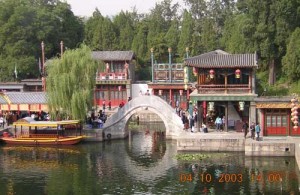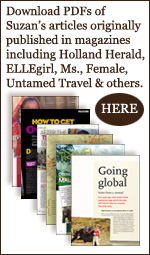Visiting the Middle Kingdom, Suzan Crane finds China full of rewards for the traveller possessing the daring of the fox, the patience of the tortise and the bowels of the elephant. (Originally published in Untamed Travel, September 2006)
 A spray of garish neon welcomed me to China, a detonation of colour, flashing lights and pageantry assaulting the senses. Kunming, the capital of Yunnan province, resembled any Chinatown in the world, but was no dime-store imitation, no emigrant-ghetto in San Francisco or Kuala Lumpur. This was the real thing, China in all its vivid, vibrant glory. I was enthralled and a bit intimidated by this Asian behemoth, a less well-trodden and more challenging destination than some of my previous travel trails. Although fascinating, a scenically splendid land steeped in culture, history and heritage, China was – and remains – one of the most exhausting and maddening countries on earth. A mangled web of contradictions – at once rigid and linear, chaotic and frenetic – where queues are nonexistent and humanity melds into a mass of flailing limbs and pulsating bodies, it is a country where manners are misplaced and restraint and personal space are alien concepts.
A spray of garish neon welcomed me to China, a detonation of colour, flashing lights and pageantry assaulting the senses. Kunming, the capital of Yunnan province, resembled any Chinatown in the world, but was no dime-store imitation, no emigrant-ghetto in San Francisco or Kuala Lumpur. This was the real thing, China in all its vivid, vibrant glory. I was enthralled and a bit intimidated by this Asian behemoth, a less well-trodden and more challenging destination than some of my previous travel trails. Although fascinating, a scenically splendid land steeped in culture, history and heritage, China was – and remains – one of the most exhausting and maddening countries on earth. A mangled web of contradictions – at once rigid and linear, chaotic and frenetic – where queues are nonexistent and humanity melds into a mass of flailing limbs and pulsating bodies, it is a country where manners are misplaced and restraint and personal space are alien concepts.
With more than 1.3 billion people (including 55 recognised ethnic minorities) it is indeed a matter of “survival of the fittest.” Initially thinking the Chinese to be surly and inhospitable, as I travelled from Yunnan and Sichuan provinces to Beijing, Inner Mongolia and Xi’an, I began to appreciate the historical and sociological circumstances that make up the character of China. With only about one percent of the population speaking English and international visitors a new phenomenon, it stands to reason that the locals, particularly in rural areas, display some wariness towards foreigners. But with Beijing hosting the 2008 Olympics and the MTV generation increasingly embracing all things Western, things are changing fast.
China, for me, was a fantastically disorienting place, a tangle of anarchic traffic (pedestrians, bicycles, cars, livestock), incomprehensible language barriers and undecipherable signage all contributing to the confusion – as alien to me as I appeared to be to the Chinese, who stared at me unabashed. Simple tasks often became trials of patience, resourcefulness and tenacity, as were the many gruelling journeys I endured. To wit: it required two hours and four buses to find the RIGHT bus going in the RIGHT direction as we navigated the theoretically short and easy jump from Dali to Lijiang, a lovely UNESCO-listed spot in Yunnan.
Mandarin, like Thai, is a tonal language with many similar words. As such, my most essential companion turned out to be a Mandarin/English phrasebook, but even that didn’t always help. Perhaps my most amusing faux pax occurred in Dali, a quaint touristy village in Yunnan, populated by colourful ethnic minorities and a battalion of aggressive vendors. Having learned to say “do not touch me,” in Mandarin, I was perplexed by the inexplicably strange reactions I elicited until I discovered that I had been bellowing “I want a friend,” to the incredulous locals.
Embracing cultures requires serious compromises, and although I’m accustomed to Asian toilets, standards in China fell to a point where I feared permanent constipation. Squat toilets were a luxury compared to the literal holes in the ground – which offered no privacy and stench that boggled the imagination – masquerading as “facilities.” Factor in the lack of decent coffee (China being the land of tea) and the vile cigarettes I was compelled to smoke (I know – good opportunity to quit), my system went into shock.
Then there was the spitting. Any rumination on China’s abundant and varied delights was persistently interrupted by the revolting sound of phlegm emission. A saying that roughly translated means, “Better out than in” is a philosophy to which the Chinese stringently adhere. Although spitting is supposed to be outlawed in some cities, nobody has told the Chinese.
Despite the annoyances, however, China’s highlights were remarkable and many. From the character-etched visages and multihued costumes of the tribal peoples (Yi, Mosu, Bai and others), to the deliriously spectacular landscapes of Yunnan and Sichuan, to the sprawling grasslands of Inner Mongolia (not to be confused with Outer Mongolia, an independent nation), to Xi’an’s fabled “underground army” of terracotta figures built by the first Qing emperor to protect him in death, and Beijing’s legendary Great Wall (which I trekked mostly on all fours due to perilous steps and my fear of heights!), Forbidden City and Summer Palace, China is a beguiling and compelling travel destination, a dizzying and profound experience which will remain forever engraved in my memory.




 Global Gypsy Collection ©2010 - 2011
Global Gypsy Collection ©2010 - 2011